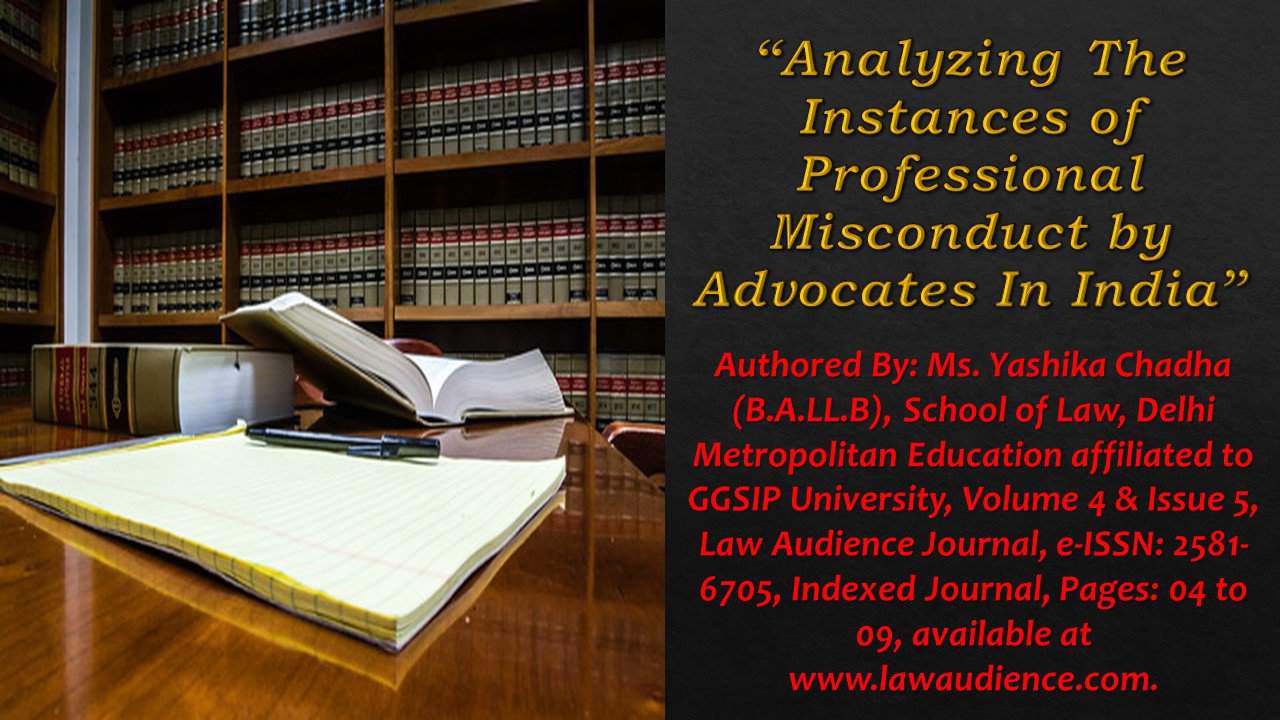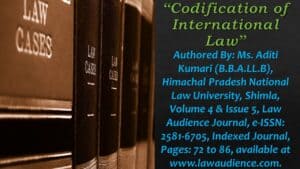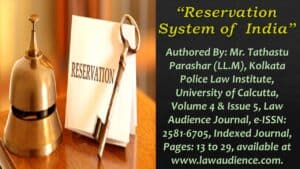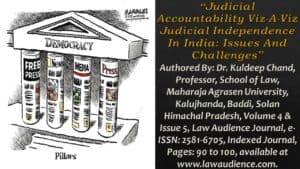Click here to download the full paper (PDF)
Authored By: Ms. Yashika Chadha (B.A.LL.B), School of Law, Delhi Metropolitan Education affiliated to GGSIP University,
Click here for Copyright Policy.
I. INTRODUCTION:
“A noble and upright vocation, advocacy. One of the most fortunate, responsible, and educated people in society may be an advocate. Given their prominent position in society, advocates may be seen as role models by other citizens. The actions of an advocate must thus constantly be governed by society. The corporate and individual levels of conduct required of professionals are included in professional ethics. Therefore, it is a requirement of any profession that those whom do it adhere to specific morals or ideals. Inappropriate behaviour is what is often referred to as “professional misconduct”. An advocate could do it to satisfy his or her own interests or to make ends meet. Professional Misconduct is any behaviour that causes a conflict with the profession or renders the advocate unsuitable for the field. Any action that prevents an advocate from practising law, to put it simply. It is obvious that the legal profession is not a company or commerce, but rather a respectable, polite, and clean line of work. Therefore, in such a career, it is important to discourage behaviours like corruption and deceit and to urge members of the profession to do everything in their power to secure justice for their customers. The reliability and status of a profession are significantly influenced by the behaviour of its members.
The behaviour of the Advocates is covered in Chapter V of the Advocates Act of 1961. The penalties for any form of advocacy misbehaviour are further described in the chapter. In accordance with Section 35 (1) of the Act[1], the State Bar Council shall refer the case to the disciplinary committee for resolution when it has reason to think that an advocate committed an act that constitutes misconduct of any kind. Although neither the Bar Council nor the Act gives a precise definition of professional misconduct, severe penalties have been established for the commission or omission of such an act by anybody enrolled as an advocate. Misconducts come in several forms. Therefore, it is essential that the term “misconduct” be recognised broadly, to the point where its meaning falls under the purview of natural law and there is no room for justification for restricting its natural meaning. In accordance with Section 49(1)(c) of the Advocates Act, read with the proviso thereto, the Bar Council of India has established Rules to be observed by Advocates with regard to the Standards of Professional Conduct and Etiquette”.[2]
The following is the preamble to Chapter II Part VI of the Bar Council of India Rules, 1961:
“An advocate shall, at all limits, comfort himself in a manner befitting his status as an officer of the court, a privileged member of the community, and a gentleman, bearing in mind that what may be lawful and moral for a person who is not a member of a Bar, or for a member of a bar in his non-professional capacity may still be improper for an Advocate. Without prejudice to the generality of the foregoing obligation, an Advocate shall fearlessly uphold the interest of his client, and in his conduct conform to the rules hereinafter mentioned both in letter and in spirit. The rules hereinafter mentioned contain canon of conduct and etiquette adopted by general guides, yet the specific mention thereof shall not be construed as a denial of the existence of other equally imperative though not specifically mentioned.”
II. THE FOLLOWING DETAILS CAN BE USED TO DESCRIBE THE INCIDENTS OF AN ADVOCATE’S MISCONDUCT:
II.I NON-PERFORMANCE OF DUTY:
This circumstance is sometimes referred to as dereliction of duty. It may be defined as a circumstance in which an advocate either transfers the case brief to another counsel or deserts the client and fails to perform the necessary duties. A move like that is thought to be unprofessional. If the advocate does it after getting the client’s permission, it is no wrongdoing. In the case of V.C Ranga Durai vs. D. Gopalan[3], the Apex Court made it clear that a lawyer who has been given a case and its brief has a responsibility to uphold professional ethical standards and, as a result, defend the client’s interests. It would be professional misconduct to do otherwise.
II.II NEGLIGENCE ON BEHALF OF PROFESSIONAL:
An advocate is supposed to use the appropriate abilities and information as the case progresses. He is also required to avoid being careless or negligent. However, carelessness on the side of the advocate combined with the fabrication of facts or failure to disclose the truth would constitute professional misconduct. In the case of Mohd. Ismail vs. Balarathna[4], the Supreme Court stated that failure to provide the needed documentation to continue the case despite repeated adjournments would constitute misconduct. Furthermore, in the case of N. Dastane vs. S. S. Shivde[5], in this case, the Supreme Court made it clear that asking for repeated adjournments by an advocate with the goal to delay or obstructing the questioning of witnesses who are a part of the case constitutes professional misconduct. The Court ruled categorically that an advocate must suffer the same consequences.
II.III MISAPPROPRIATION:
Misappropriation is the situation in which a lawyer obtains money from a client for case-related objectives, but the lawyer then inappropriately utilises the money for purposes unrelated to the case. Misconduct is one sort of misappropriation. In the case of D. Lal vs. SBI[6], in this case, a lawyer was accused of stealing the money he had received from the client. The money was obtained in order to file a lawsuit, and the remaining sum represented professional expenses. The attorney accusing the High Court said that the litigation papers had been misplaced by the High Court registry. However, it was discovered that the advocate had not re-filed the lawsuit for a considerable amount of time after the register had returned the suit documents to the attorney for the removal of objections. A committee for disciplinary action was formed against the lawyer. The committee penalised the advocate for misbehaviour after finding the advocate guilty of embezzling client-paid money.
II.IV FURNISHING FALSE INFORMATION:
It is improper for an advocate to intentionally provide a public servant with misleading information. The information might be about an offence that has already been committed or it could be about an offence that is about to be committed and how to stop it. The advocate will be held accountable for this professional misconduct if he or she knows or has cause to suspect that the information being provided is inaccurate. In the case Emperor vs. K.C.B a Pleader[7], the Municipal officials confiscated certain cartons of “ghee” after receiving information that the “ghee” was being tampered with. The authorities mandated that Mr. Bazrang Marwari be in charge of or watch over the boxes. The counsel misinformed Mr. Bazrang Marwari that the Municipal authorities had ordered that the boxes be returned to their proper owner. The advocate was found guilty of misconduct since the information he provided was fraudulent, and action was taken against him.
II.V CONTEMPT OF COURT & INAPPROPRIATE BEHAVIOUR BEFORE THE MAGISTRATE:
The act of disrespecting or being disobedient to a court of law or any of its officials by an advocate is known as contempt of court. This behaviour goes against the justice, authority, and dignity of the court. An advocate has a responsibility to uphold and respect the court’s honour. Any false accusations levelled against a member of the judiciary are considered misconduct. There are two different kinds of contempt: acting improperly in front of the judges in court or completely defying their orders. M.V. Jayarajan, the head of the Communist Party of India, was given a six-month prison term for contempt of court in 2010 after making statements that were critical of the Kerala High Court’s decision to forbid gatherings of people in public places. However, following an appeal to the Supreme Court, his term was shortened to four months. [8]
II.VI CHANGING SIDES:
During the course of the litigation, an advocate cannot change parties. To protect the interests of the client, all advocates have a duty to provide the case with their best effort. He is not permitted to speak on behalf of opposing parties. Simply put, an advocate is not permitted to represent two parties in a matter. The responsible counsel has engaged in grave misconduct by switching sides or defending the interests of both parties to the case. In the case of State vs. Lalit Mohan Nanda[9], as a consequence of an investigation into Mr. Nanda, because he had represented a client who had hired him for the same matter, this lawsuit came to be. The conflict between the stepbrothers sprang from a family disagreement around ownership of a specific plot of property. Mr. Nanda testified on behalf of one of the brothers, gaining access to secret information and learning about his version of the story. Later, the second brother hired him for an identical issue, and he was successful in getting the ruling in his favour. He was disciplined for professional misconduct as a result of representing both sides in the case.
II.VII GIVING INAPPROPRIATE ADVICE:
Since advocacy is a morally upright, honourable, and noble profession, it is the responsibility of an advocate to offer his clients the best of his expertise, judgment, and abilities. Every time a client consults with him, an advocate must provide appropriate guidance. If the advocate is unable to take on the client’s case, he or she must encourage the client to seek the guidance of another attorney rather than provide inappropriate advice that might endanger the client in any manner. The advocate is acting improperly if they give bad or incorrect counsel. These specific behaviours constitute professional misconduct. A lawyer might be accused of professional misconduct in a number of other situations, though.
III. CONCLUSION:
The legal profession is extremely important. Since the practice of law is seen as a noble and upright profession, it is critical that professional ethics are upheld. In certain cases, an attorney has tried to kill one of his own clients. Therefore, it is crucial to ensure that those with such criminal inclinations are not permitted to shield others from punishment. There are a few rules that guarantee a person applying to become an advocate has no criminal history, but they are insufficient to guarantee the person doesn’t have criminal inclinations. As a result, it is imperative that lawmakers enact and amend legislation that addresses the numerous sorts of wrongdoing in this field. Several allegations of professional misconduct have been made in the current case when the Covid-19 pandemic did start an online trial. It is against the court’s rules for attorneys to come informally before the honourable court and follow the dress code.
A Senior Advocate was observed smoking hookah during a live, online hearing before the Rajasthan High Court. Even from a noble profession, there are some things that are not anticipated. It is not appropriate for a person of such rank to engage in such misbehaviour; a lawyer is expected to shield clients from punishment. In order to instruct legal professionals, the Bar Councils of each state are required to provide annual education programs on the dos and don’ts of the profession. Reminding the Advocates of their many professional obligations is equally crucial. Strict penalties must be imposed on the accused in cases of misbehaviour in order to serve as role models for the other Advocates.
Cite this article as:
Ms. Yashika Chadha, “Analyzing The Instances of Professional Misconduct by Advocates In India”, Vol.4 & Issue 5, Law Audience Journal (e-ISSN: 2581-6705), Pages 04 to 09 (18th December 2022), available at https://www.lawaudience.com/analyzing-the-instances-of-professional-misconduct-by-advocates-in-india/.
Footnotes & References:
[1] Section 35 in The Advocates Act, 1961, Punishment of advocates for misconduct— (1) Where on receipt of a complaint or otherwise a State Bar Council has reason to believe that any advocate on its roll has been guilty of professional or other misconduct, it shall refer the case for disposal to its disciplinary committee.
[2] Misconduct of Lawyers in India, available at: http://www.legalservicesindia.com/article/1665/Professionalmisconduct-of-lawyers-in-india.html (Visited on 11th November, 2022).
[3] V.C Ranga Durai v. D. Gopalan, AIR 1979 SC 281.
[4] Mohd. Ismail v. Balarathna, AIR 1965 Mys. 28.
[5] N. Dastane v. S. S. Shivde, AIR 2001 SC 2028.
[6] D. Lal v. SBI, AIR 1993 SC 1608.
[7] Emperor v. K.C.B a Pleader, AIR 1935 Cal. 547.
[8] Professional Misconduct, available at: https://easyadvocacy.com/EADigest/Professional-Misconduct-and-ItsImplications-Under-Advocates-Act-1961 (Visited on 11th November, 2022)
[9] State v. Lalit Mohan Nanda, AIR 1961 Ori 1.




